Tesco: Organisational Behaviour Report and Analysis
VerifiedAdded on 2023/01/06
|16
|4976
|37
Report
AI Summary
This report provides a comprehensive analysis of organisational behaviour within Tesco, a British multinational grocery and general merchandise retailer. It explores the influence of organisational culture, power dynamics, and politics on individual and team behaviour and performance, referencing Handy's Culture Typology and French and Raven's Power Types. The report also examines content and process theories of motivation, specifically McClelland's theory of needs and Vroom's Expectancy Theory, illustrating their application within Tesco. Furthermore, it differentiates between effective and ineffective teams and applies concepts and philosophies of organisational behaviour to a given business situation. The analysis highlights how factors such as reward power, cultural differences, and globalisation impact Tesco's operational effectiveness and employee motivation. The report concludes by summarizing the key findings and implications for Tesco's management practices.
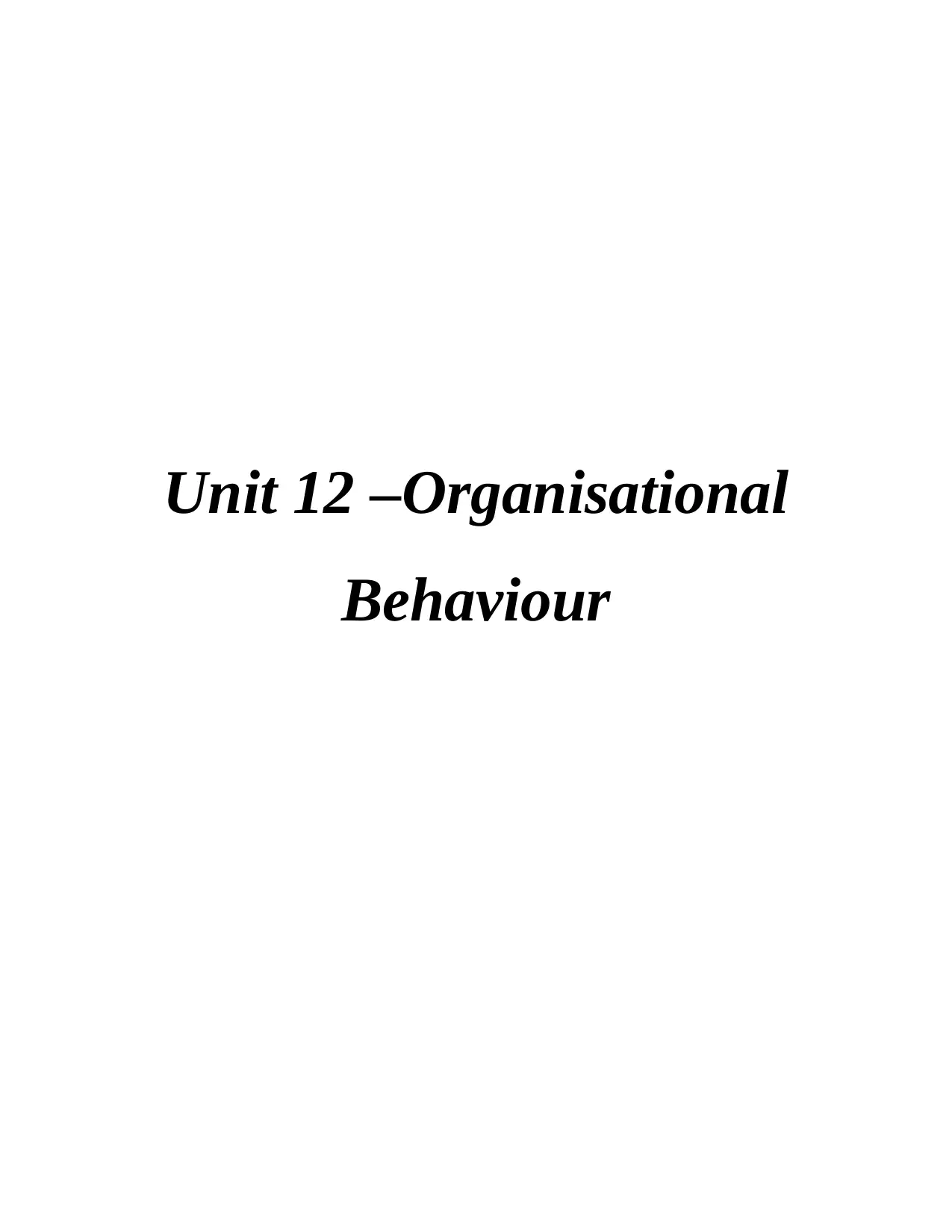
Unit 12 –Organisational
Behaviour
Behaviour
Paraphrase This Document
Need a fresh take? Get an instant paraphrase of this document with our AI Paraphraser
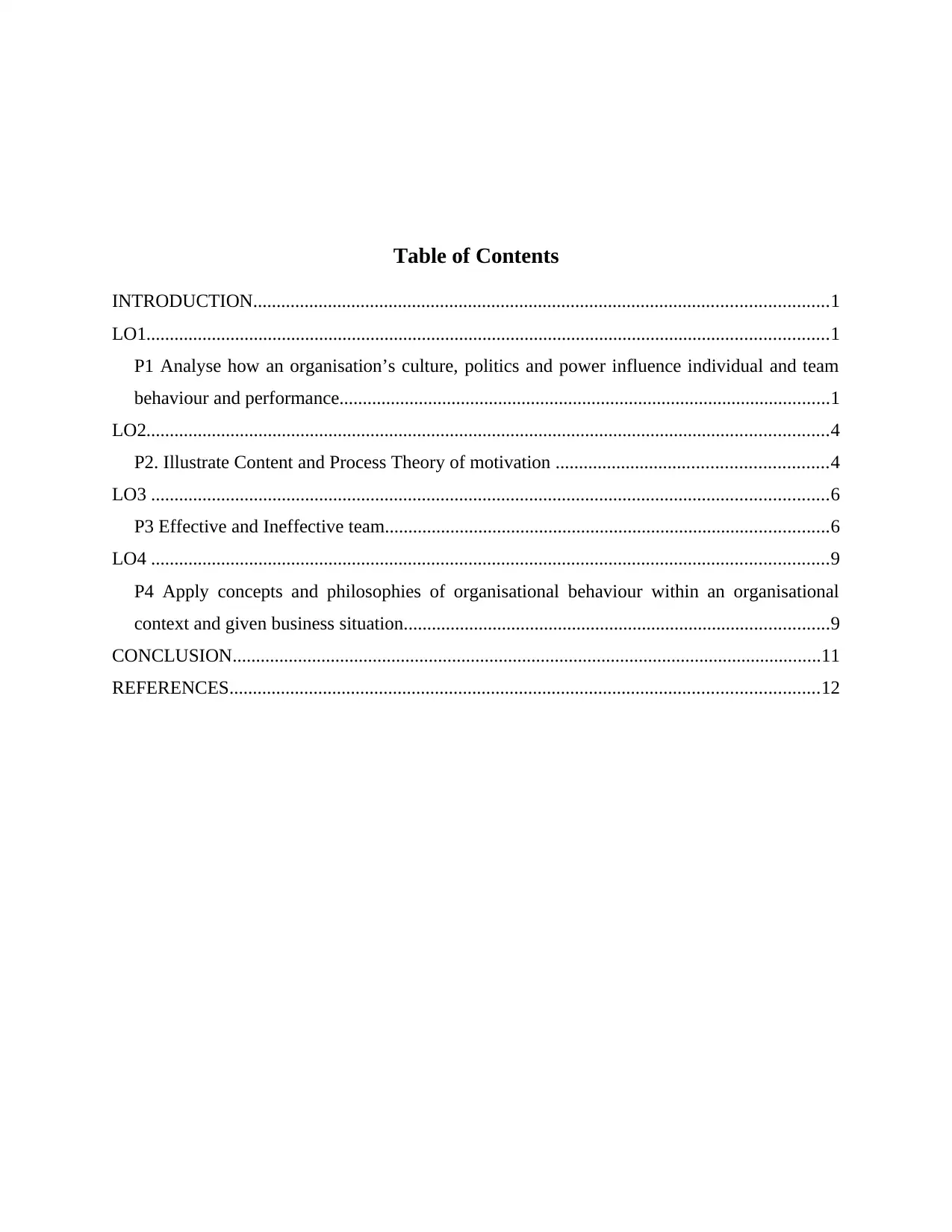
Table of Contents
INTRODUCTION...........................................................................................................................1
LO1..................................................................................................................................................1
P1 Analyse how an organisation’s culture, politics and power influence individual and team
behaviour and performance.........................................................................................................1
LO2..................................................................................................................................................4
P2. Illustrate Content and Process Theory of motivation ..........................................................4
LO3 .................................................................................................................................................6
P3 Effective and Ineffective team...............................................................................................6
LO4 .................................................................................................................................................9
P4 Apply concepts and philosophies of organisational behaviour within an organisational
context and given business situation...........................................................................................9
CONCLUSION..............................................................................................................................11
REFERENCES..............................................................................................................................12
INTRODUCTION...........................................................................................................................1
LO1..................................................................................................................................................1
P1 Analyse how an organisation’s culture, politics and power influence individual and team
behaviour and performance.........................................................................................................1
LO2..................................................................................................................................................4
P2. Illustrate Content and Process Theory of motivation ..........................................................4
LO3 .................................................................................................................................................6
P3 Effective and Ineffective team...............................................................................................6
LO4 .................................................................................................................................................9
P4 Apply concepts and philosophies of organisational behaviour within an organisational
context and given business situation...........................................................................................9
CONCLUSION..............................................................................................................................11
REFERENCES..............................................................................................................................12
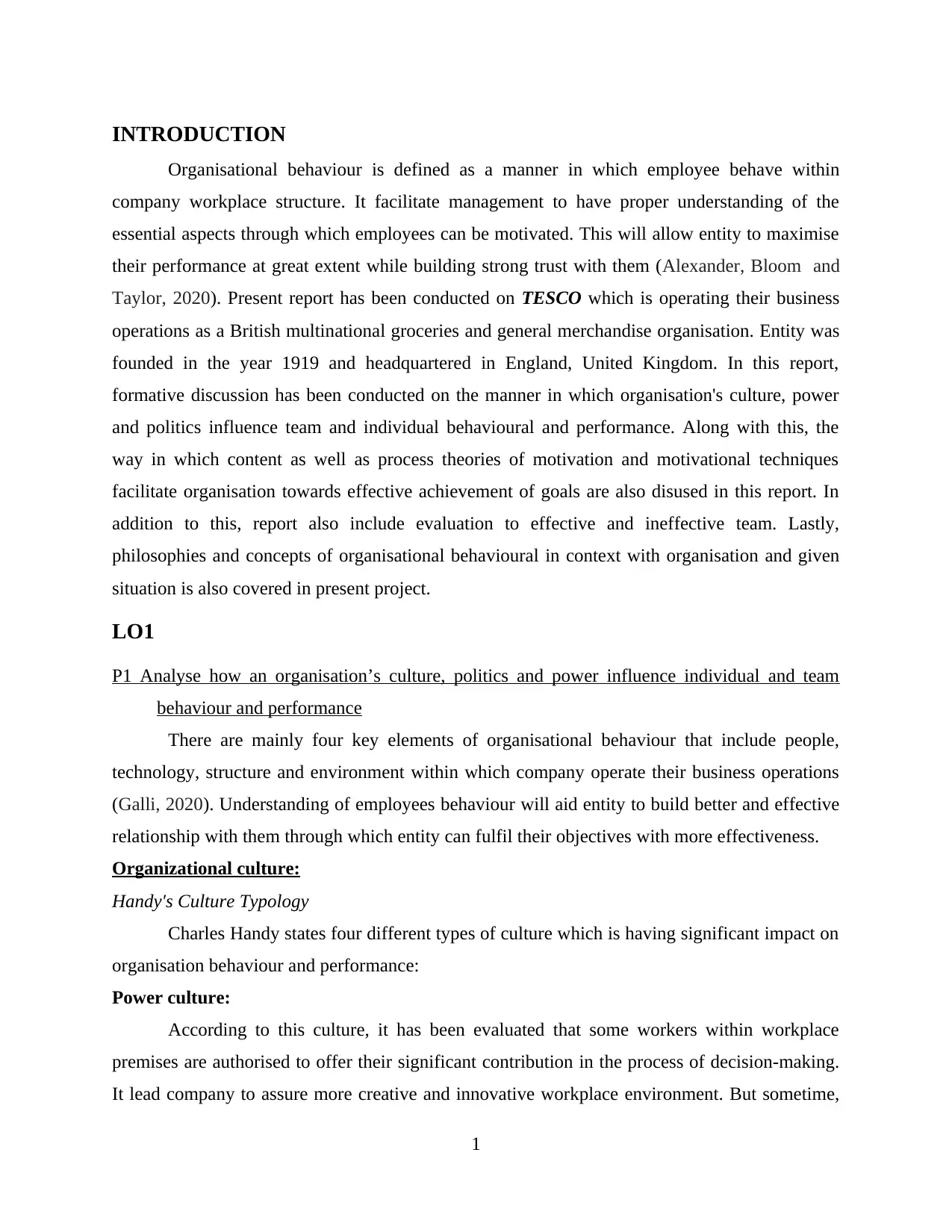
INTRODUCTION
Organisational behaviour is defined as a manner in which employee behave within
company workplace structure. It facilitate management to have proper understanding of the
essential aspects through which employees can be motivated. This will allow entity to maximise
their performance at great extent while building strong trust with them (Alexander, Bloom and
Taylor, 2020). Present report has been conducted on TESCO which is operating their business
operations as a British multinational groceries and general merchandise organisation. Entity was
founded in the year 1919 and headquartered in England, United Kingdom. In this report,
formative discussion has been conducted on the manner in which organisation's culture, power
and politics influence team and individual behavioural and performance. Along with this, the
way in which content as well as process theories of motivation and motivational techniques
facilitate organisation towards effective achievement of goals are also disused in this report. In
addition to this, report also include evaluation to effective and ineffective team. Lastly,
philosophies and concepts of organisational behavioural in context with organisation and given
situation is also covered in present project.
LO1
P1 Analyse how an organisation’s culture, politics and power influence individual and team
behaviour and performance
There are mainly four key elements of organisational behaviour that include people,
technology, structure and environment within which company operate their business operations
(Galli, 2020). Understanding of employees behaviour will aid entity to build better and effective
relationship with them through which entity can fulfil their objectives with more effectiveness.
Organizational culture:
Handy's Culture Typology
Charles Handy states four different types of culture which is having significant impact on
organisation behaviour and performance:
Power culture:
According to this culture, it has been evaluated that some workers within workplace
premises are authorised to offer their significant contribution in the process of decision-making.
It lead company to assure more creative and innovative workplace environment. But sometime,
1
Organisational behaviour is defined as a manner in which employee behave within
company workplace structure. It facilitate management to have proper understanding of the
essential aspects through which employees can be motivated. This will allow entity to maximise
their performance at great extent while building strong trust with them (Alexander, Bloom and
Taylor, 2020). Present report has been conducted on TESCO which is operating their business
operations as a British multinational groceries and general merchandise organisation. Entity was
founded in the year 1919 and headquartered in England, United Kingdom. In this report,
formative discussion has been conducted on the manner in which organisation's culture, power
and politics influence team and individual behavioural and performance. Along with this, the
way in which content as well as process theories of motivation and motivational techniques
facilitate organisation towards effective achievement of goals are also disused in this report. In
addition to this, report also include evaluation to effective and ineffective team. Lastly,
philosophies and concepts of organisational behavioural in context with organisation and given
situation is also covered in present project.
LO1
P1 Analyse how an organisation’s culture, politics and power influence individual and team
behaviour and performance
There are mainly four key elements of organisational behaviour that include people,
technology, structure and environment within which company operate their business operations
(Galli, 2020). Understanding of employees behaviour will aid entity to build better and effective
relationship with them through which entity can fulfil their objectives with more effectiveness.
Organizational culture:
Handy's Culture Typology
Charles Handy states four different types of culture which is having significant impact on
organisation behaviour and performance:
Power culture:
According to this culture, it has been evaluated that some workers within workplace
premises are authorised to offer their significant contribution in the process of decision-making.
It lead company to assure more creative and innovative workplace environment. But sometime,
1
⊘ This is a preview!⊘
Do you want full access?
Subscribe today to unlock all pages.

Trusted by 1+ million students worldwide
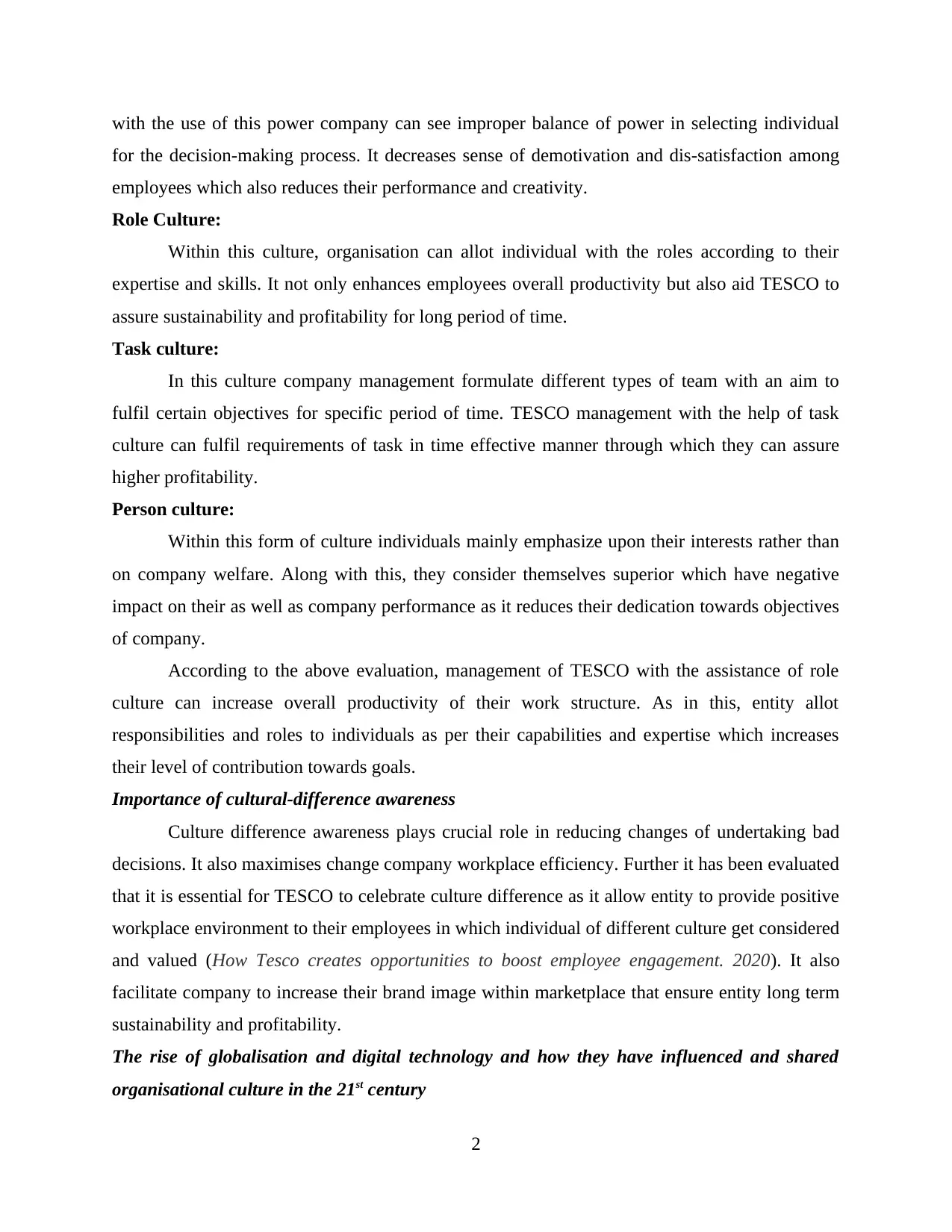
with the use of this power company can see improper balance of power in selecting individual
for the decision-making process. It decreases sense of demotivation and dis-satisfaction among
employees which also reduces their performance and creativity.
Role Culture:
Within this culture, organisation can allot individual with the roles according to their
expertise and skills. It not only enhances employees overall productivity but also aid TESCO to
assure sustainability and profitability for long period of time.
Task culture:
In this culture company management formulate different types of team with an aim to
fulfil certain objectives for specific period of time. TESCO management with the help of task
culture can fulfil requirements of task in time effective manner through which they can assure
higher profitability.
Person culture:
Within this form of culture individuals mainly emphasize upon their interests rather than
on company welfare. Along with this, they consider themselves superior which have negative
impact on their as well as company performance as it reduces their dedication towards objectives
of company.
According to the above evaluation, management of TESCO with the assistance of role
culture can increase overall productivity of their work structure. As in this, entity allot
responsibilities and roles to individuals as per their capabilities and expertise which increases
their level of contribution towards goals.
Importance of cultural-difference awareness
Culture difference awareness plays crucial role in reducing changes of undertaking bad
decisions. It also maximises change company workplace efficiency. Further it has been evaluated
that it is essential for TESCO to celebrate culture difference as it allow entity to provide positive
workplace environment to their employees in which individual of different culture get considered
and valued (How Tesco creates opportunities to boost employee engagement. 2020). It also
facilitate company to increase their brand image within marketplace that ensure entity long term
sustainability and profitability.
The rise of globalisation and digital technology and how they have influenced and shared
organisational culture in the 21st century
2
for the decision-making process. It decreases sense of demotivation and dis-satisfaction among
employees which also reduces their performance and creativity.
Role Culture:
Within this culture, organisation can allot individual with the roles according to their
expertise and skills. It not only enhances employees overall productivity but also aid TESCO to
assure sustainability and profitability for long period of time.
Task culture:
In this culture company management formulate different types of team with an aim to
fulfil certain objectives for specific period of time. TESCO management with the help of task
culture can fulfil requirements of task in time effective manner through which they can assure
higher profitability.
Person culture:
Within this form of culture individuals mainly emphasize upon their interests rather than
on company welfare. Along with this, they consider themselves superior which have negative
impact on their as well as company performance as it reduces their dedication towards objectives
of company.
According to the above evaluation, management of TESCO with the assistance of role
culture can increase overall productivity of their work structure. As in this, entity allot
responsibilities and roles to individuals as per their capabilities and expertise which increases
their level of contribution towards goals.
Importance of cultural-difference awareness
Culture difference awareness plays crucial role in reducing changes of undertaking bad
decisions. It also maximises change company workplace efficiency. Further it has been evaluated
that it is essential for TESCO to celebrate culture difference as it allow entity to provide positive
workplace environment to their employees in which individual of different culture get considered
and valued (How Tesco creates opportunities to boost employee engagement. 2020). It also
facilitate company to increase their brand image within marketplace that ensure entity long term
sustainability and profitability.
The rise of globalisation and digital technology and how they have influenced and shared
organisational culture in the 21st century
2
Paraphrase This Document
Need a fresh take? Get an instant paraphrase of this document with our AI Paraphraser
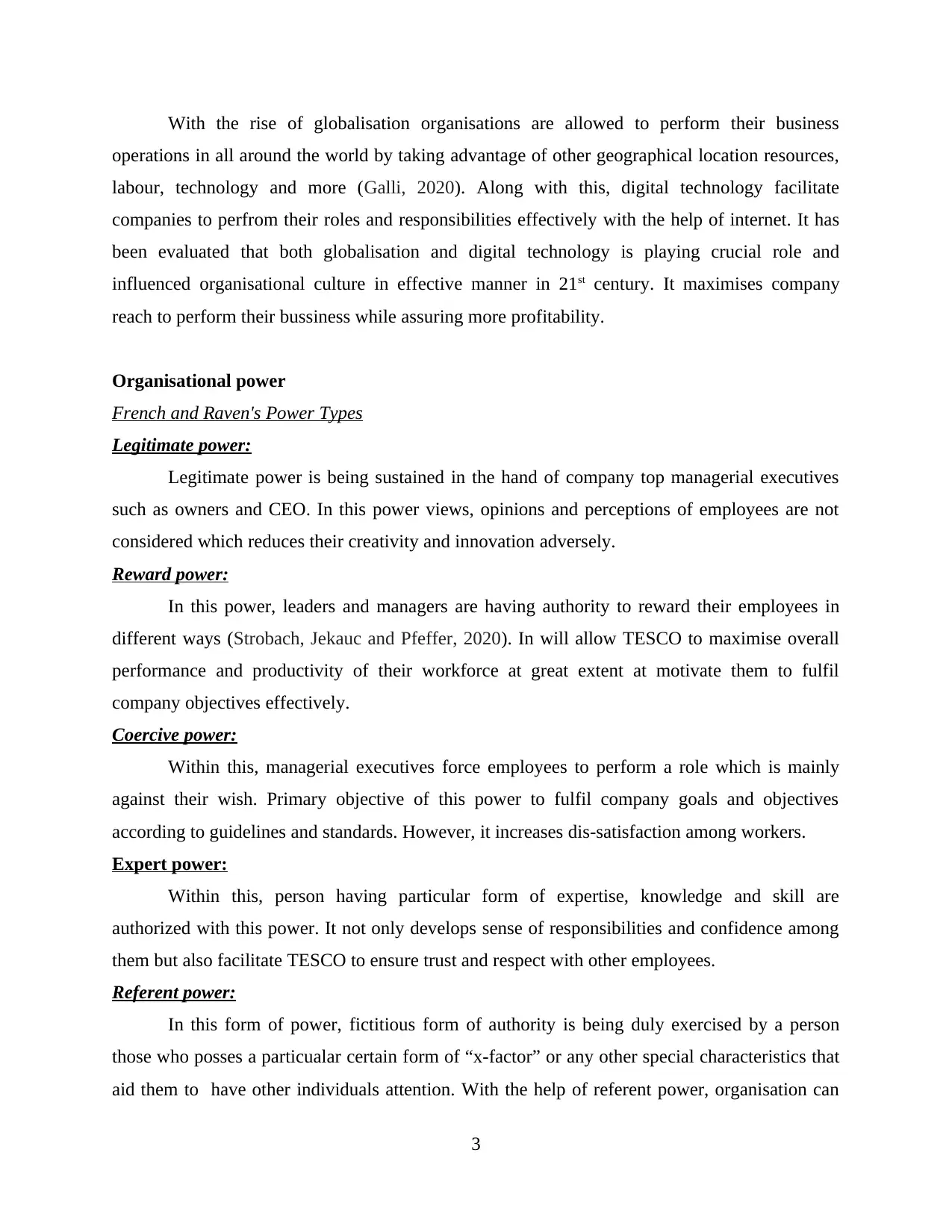
With the rise of globalisation organisations are allowed to perform their business
operations in all around the world by taking advantage of other geographical location resources,
labour, technology and more (Galli, 2020). Along with this, digital technology facilitate
companies to perfrom their roles and responsibilities effectively with the help of internet. It has
been evaluated that both globalisation and digital technology is playing crucial role and
influenced organisational culture in effective manner in 21st century. It maximises company
reach to perform their bussiness while assuring more profitability.
Organisational power
French and Raven's Power Types
Legitimate power:
Legitimate power is being sustained in the hand of company top managerial executives
such as owners and CEO. In this power views, opinions and perceptions of employees are not
considered which reduces their creativity and innovation adversely.
Reward power:
In this power, leaders and managers are having authority to reward their employees in
different ways (Strobach, Jekauc and Pfeffer, 2020). In will allow TESCO to maximise overall
performance and productivity of their workforce at great extent at motivate them to fulfil
company objectives effectively.
Coercive power:
Within this, managerial executives force employees to perform a role which is mainly
against their wish. Primary objective of this power to fulfil company goals and objectives
according to guidelines and standards. However, it increases dis-satisfaction among workers.
Expert power:
Within this, person having particular form of expertise, knowledge and skill are
authorized with this power. It not only develops sense of responsibilities and confidence among
them but also facilitate TESCO to ensure trust and respect with other employees.
Referent power:
In this form of power, fictitious form of authority is being duly exercised by a person
those who posses a particualar certain form of “x-factor” or any other special characteristics that
aid them to have other individuals attention. With the help of referent power, organisation can
3
operations in all around the world by taking advantage of other geographical location resources,
labour, technology and more (Galli, 2020). Along with this, digital technology facilitate
companies to perfrom their roles and responsibilities effectively with the help of internet. It has
been evaluated that both globalisation and digital technology is playing crucial role and
influenced organisational culture in effective manner in 21st century. It maximises company
reach to perform their bussiness while assuring more profitability.
Organisational power
French and Raven's Power Types
Legitimate power:
Legitimate power is being sustained in the hand of company top managerial executives
such as owners and CEO. In this power views, opinions and perceptions of employees are not
considered which reduces their creativity and innovation adversely.
Reward power:
In this power, leaders and managers are having authority to reward their employees in
different ways (Strobach, Jekauc and Pfeffer, 2020). In will allow TESCO to maximise overall
performance and productivity of their workforce at great extent at motivate them to fulfil
company objectives effectively.
Coercive power:
Within this, managerial executives force employees to perform a role which is mainly
against their wish. Primary objective of this power to fulfil company goals and objectives
according to guidelines and standards. However, it increases dis-satisfaction among workers.
Expert power:
Within this, person having particular form of expertise, knowledge and skill are
authorized with this power. It not only develops sense of responsibilities and confidence among
them but also facilitate TESCO to ensure trust and respect with other employees.
Referent power:
In this form of power, fictitious form of authority is being duly exercised by a person
those who posses a particualar certain form of “x-factor” or any other special characteristics that
aid them to have other individuals attention. With the help of referent power, organisation can
3
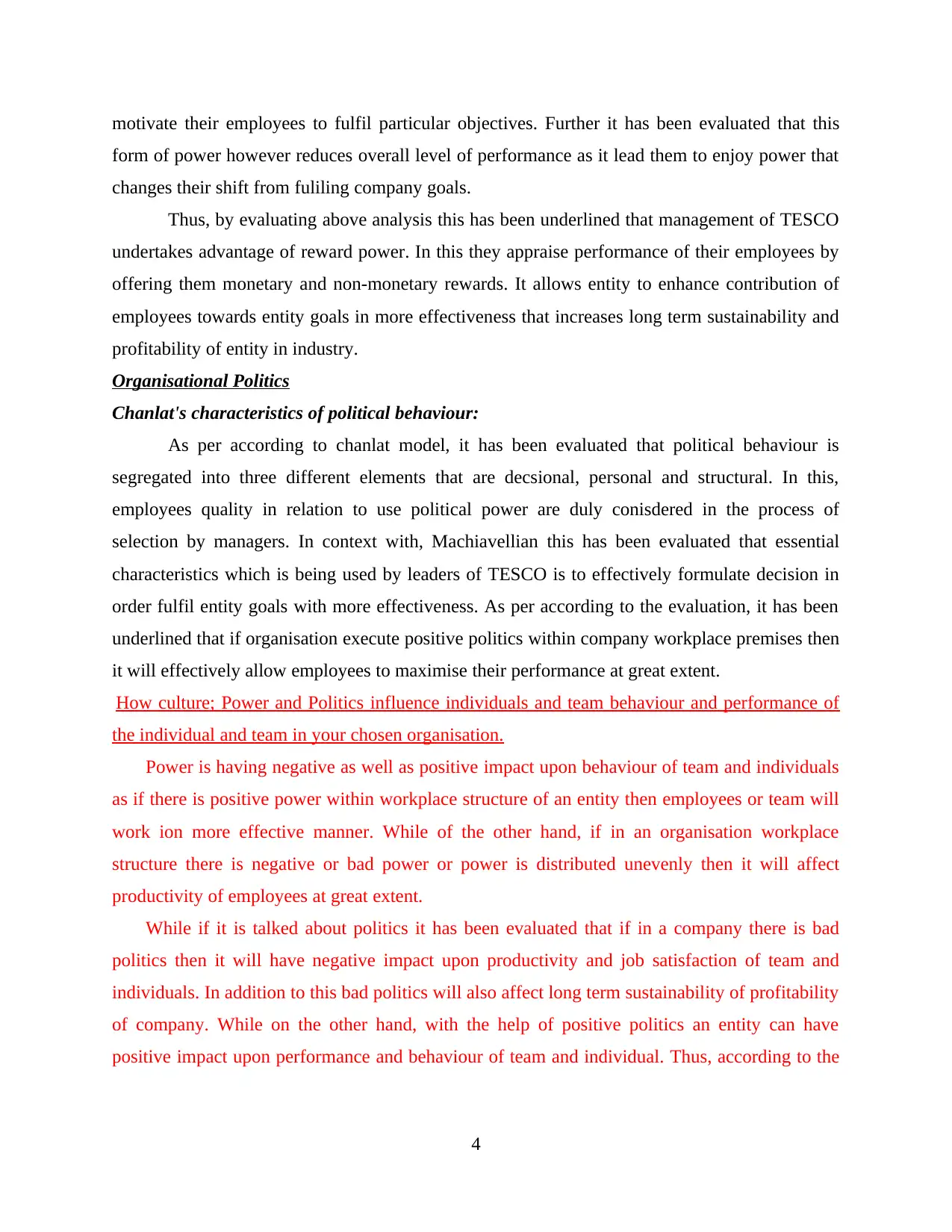
motivate their employees to fulfil particular objectives. Further it has been evaluated that this
form of power however reduces overall level of performance as it lead them to enjoy power that
changes their shift from fuliling company goals.
Thus, by evaluating above analysis this has been underlined that management of TESCO
undertakes advantage of reward power. In this they appraise performance of their employees by
offering them monetary and non-monetary rewards. It allows entity to enhance contribution of
employees towards entity goals in more effectiveness that increases long term sustainability and
profitability of entity in industry.
Organisational Politics
Chanlat's characteristics of political behaviour:
As per according to chanlat model, it has been evaluated that political behaviour is
segregated into three different elements that are decsional, personal and structural. In this,
employees quality in relation to use political power are duly conisdered in the process of
selection by managers. In context with, Machiavellian this has been evaluated that essential
characteristics which is being used by leaders of TESCO is to effectively formulate decision in
order fulfil entity goals with more effectiveness. As per according to the evaluation, it has been
underlined that if organisation execute positive politics within company workplace premises then
it will effectively allow employees to maximise their performance at great extent.
How culture; Power and Politics influence individuals and team behaviour and performance of
the individual and team in your chosen organisation.
Power is having negative as well as positive impact upon behaviour of team and individuals
as if there is positive power within workplace structure of an entity then employees or team will
work ion more effective manner. While of the other hand, if in an organisation workplace
structure there is negative or bad power or power is distributed unevenly then it will affect
productivity of employees at great extent.
While if it is talked about politics it has been evaluated that if in a company there is bad
politics then it will have negative impact upon productivity and job satisfaction of team and
individuals. In addition to this bad politics will also affect long term sustainability of profitability
of company. While on the other hand, with the help of positive politics an entity can have
positive impact upon performance and behaviour of team and individual. Thus, according to the
4
form of power however reduces overall level of performance as it lead them to enjoy power that
changes their shift from fuliling company goals.
Thus, by evaluating above analysis this has been underlined that management of TESCO
undertakes advantage of reward power. In this they appraise performance of their employees by
offering them monetary and non-monetary rewards. It allows entity to enhance contribution of
employees towards entity goals in more effectiveness that increases long term sustainability and
profitability of entity in industry.
Organisational Politics
Chanlat's characteristics of political behaviour:
As per according to chanlat model, it has been evaluated that political behaviour is
segregated into three different elements that are decsional, personal and structural. In this,
employees quality in relation to use political power are duly conisdered in the process of
selection by managers. In context with, Machiavellian this has been evaluated that essential
characteristics which is being used by leaders of TESCO is to effectively formulate decision in
order fulfil entity goals with more effectiveness. As per according to the evaluation, it has been
underlined that if organisation execute positive politics within company workplace premises then
it will effectively allow employees to maximise their performance at great extent.
How culture; Power and Politics influence individuals and team behaviour and performance of
the individual and team in your chosen organisation.
Power is having negative as well as positive impact upon behaviour of team and individuals
as if there is positive power within workplace structure of an entity then employees or team will
work ion more effective manner. While of the other hand, if in an organisation workplace
structure there is negative or bad power or power is distributed unevenly then it will affect
productivity of employees at great extent.
While if it is talked about politics it has been evaluated that if in a company there is bad
politics then it will have negative impact upon productivity and job satisfaction of team and
individuals. In addition to this bad politics will also affect long term sustainability of profitability
of company. While on the other hand, with the help of positive politics an entity can have
positive impact upon performance and behaviour of team and individual. Thus, according to the
4
⊘ This is a preview!⊘
Do you want full access?
Subscribe today to unlock all pages.

Trusted by 1+ million students worldwide
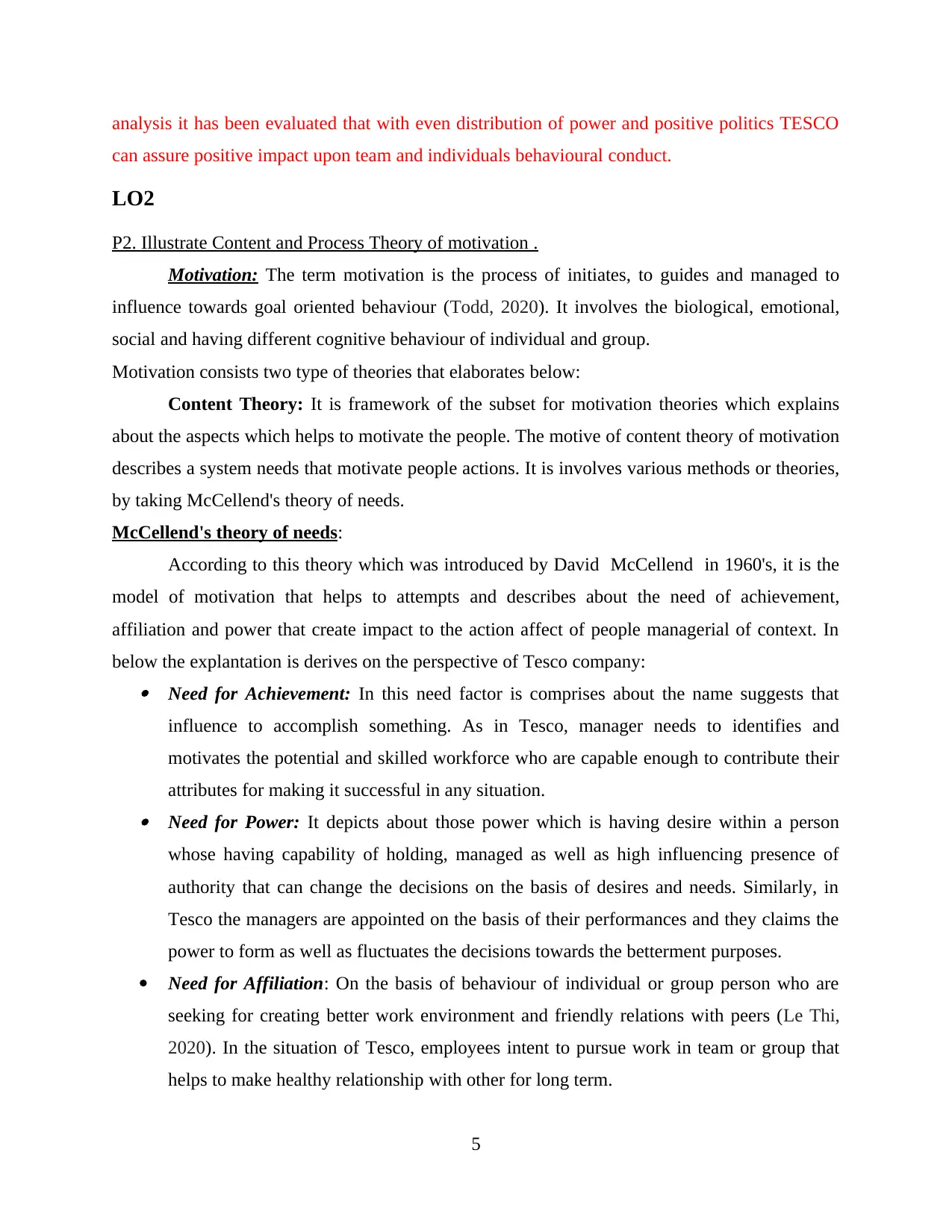
analysis it has been evaluated that with even distribution of power and positive politics TESCO
can assure positive impact upon team and individuals behavioural conduct.
LO2
P2. Illustrate Content and Process Theory of motivation .
Motivation: The term motivation is the process of initiates, to guides and managed to
influence towards goal oriented behaviour (Todd, 2020). It involves the biological, emotional,
social and having different cognitive behaviour of individual and group.
Motivation consists two type of theories that elaborates below:
Content Theory: It is framework of the subset for motivation theories which explains
about the aspects which helps to motivate the people. The motive of content theory of motivation
describes a system needs that motivate people actions. It is involves various methods or theories,
by taking McCellend's theory of needs.
McCellend's theory of needs:
According to this theory which was introduced by David McCellend in 1960's, it is the
model of motivation that helps to attempts and describes about the need of achievement,
affiliation and power that create impact to the action affect of people managerial of context. In
below the explantation is derives on the perspective of Tesco company: Need for Achievement: In this need factor is comprises about the name suggests that
influence to accomplish something. As in Tesco, manager needs to identifies and
motivates the potential and skilled workforce who are capable enough to contribute their
attributes for making it successful in any situation. Need for Power: It depicts about those power which is having desire within a person
whose having capability of holding, managed as well as high influencing presence of
authority that can change the decisions on the basis of desires and needs. Similarly, in
Tesco the managers are appointed on the basis of their performances and they claims the
power to form as well as fluctuates the decisions towards the betterment purposes.
Need for Affiliation: On the basis of behaviour of individual or group person who are
seeking for creating better work environment and friendly relations with peers (Le Thi,
2020). In the situation of Tesco, employees intent to pursue work in team or group that
helps to make healthy relationship with other for long term.
5
can assure positive impact upon team and individuals behavioural conduct.
LO2
P2. Illustrate Content and Process Theory of motivation .
Motivation: The term motivation is the process of initiates, to guides and managed to
influence towards goal oriented behaviour (Todd, 2020). It involves the biological, emotional,
social and having different cognitive behaviour of individual and group.
Motivation consists two type of theories that elaborates below:
Content Theory: It is framework of the subset for motivation theories which explains
about the aspects which helps to motivate the people. The motive of content theory of motivation
describes a system needs that motivate people actions. It is involves various methods or theories,
by taking McCellend's theory of needs.
McCellend's theory of needs:
According to this theory which was introduced by David McCellend in 1960's, it is the
model of motivation that helps to attempts and describes about the need of achievement,
affiliation and power that create impact to the action affect of people managerial of context. In
below the explantation is derives on the perspective of Tesco company: Need for Achievement: In this need factor is comprises about the name suggests that
influence to accomplish something. As in Tesco, manager needs to identifies and
motivates the potential and skilled workforce who are capable enough to contribute their
attributes for making it successful in any situation. Need for Power: It depicts about those power which is having desire within a person
whose having capability of holding, managed as well as high influencing presence of
authority that can change the decisions on the basis of desires and needs. Similarly, in
Tesco the managers are appointed on the basis of their performances and they claims the
power to form as well as fluctuates the decisions towards the betterment purposes.
Need for Affiliation: On the basis of behaviour of individual or group person who are
seeking for creating better work environment and friendly relations with peers (Le Thi,
2020). In the situation of Tesco, employees intent to pursue work in team or group that
helps to make healthy relationship with other for long term.
5
Paraphrase This Document
Need a fresh take? Get an instant paraphrase of this document with our AI Paraphraser
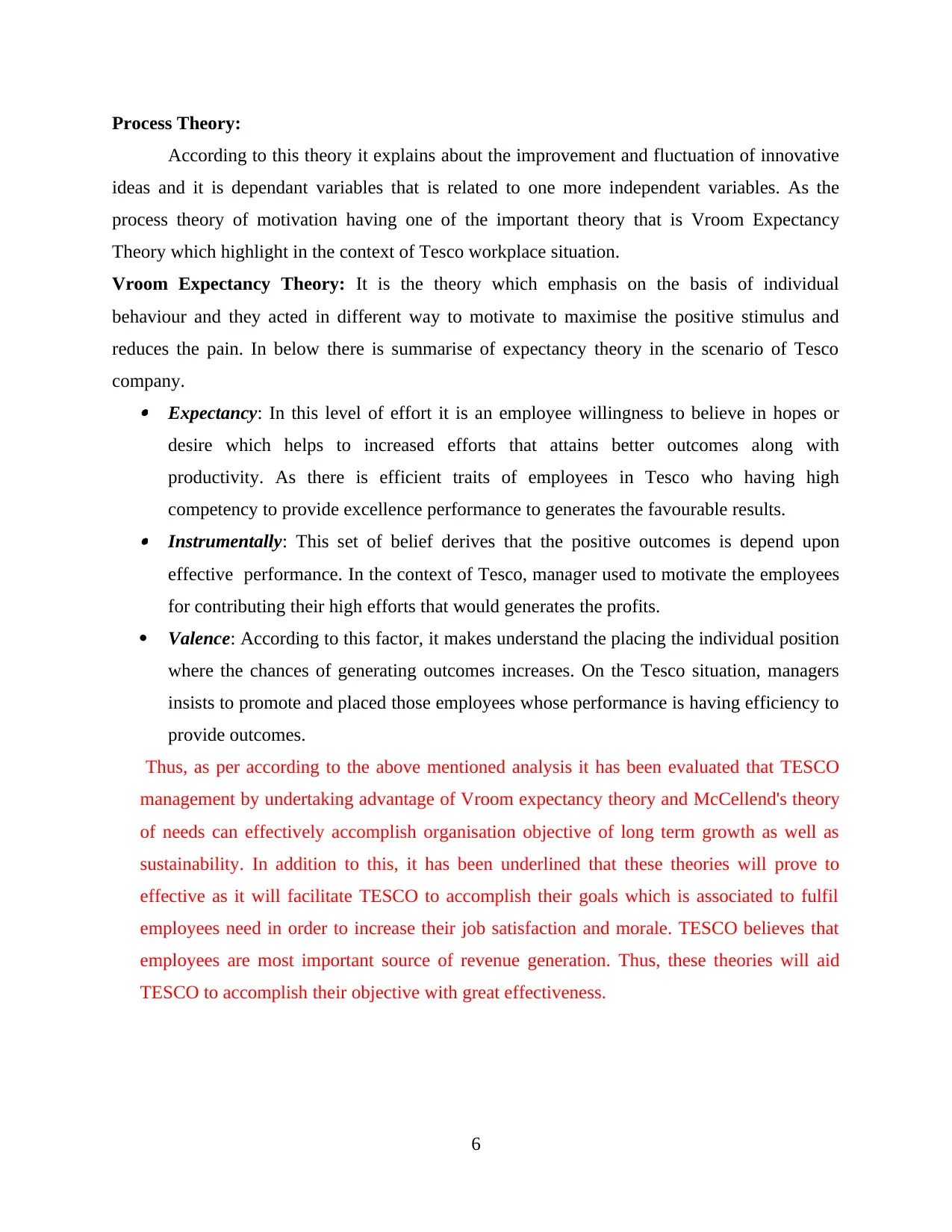
Process Theory:
According to this theory it explains about the improvement and fluctuation of innovative
ideas and it is dependant variables that is related to one more independent variables. As the
process theory of motivation having one of the important theory that is Vroom Expectancy
Theory which highlight in the context of Tesco workplace situation.
Vroom Expectancy Theory: It is the theory which emphasis on the basis of individual
behaviour and they acted in different way to motivate to maximise the positive stimulus and
reduces the pain. In below there is summarise of expectancy theory in the scenario of Tesco
company. Expectancy: In this level of effort it is an employee willingness to believe in hopes or
desire which helps to increased efforts that attains better outcomes along with
productivity. As there is efficient traits of employees in Tesco who having high
competency to provide excellence performance to generates the favourable results. Instrumentally: This set of belief derives that the positive outcomes is depend upon
effective performance. In the context of Tesco, manager used to motivate the employees
for contributing their high efforts that would generates the profits.
Valence: According to this factor, it makes understand the placing the individual position
where the chances of generating outcomes increases. On the Tesco situation, managers
insists to promote and placed those employees whose performance is having efficiency to
provide outcomes.
Thus, as per according to the above mentioned analysis it has been evaluated that TESCO
management by undertaking advantage of Vroom expectancy theory and McCellend's theory
of needs can effectively accomplish organisation objective of long term growth as well as
sustainability. In addition to this, it has been underlined that these theories will prove to
effective as it will facilitate TESCO to accomplish their goals which is associated to fulfil
employees need in order to increase their job satisfaction and morale. TESCO believes that
employees are most important source of revenue generation. Thus, these theories will aid
TESCO to accomplish their objective with great effectiveness.
6
According to this theory it explains about the improvement and fluctuation of innovative
ideas and it is dependant variables that is related to one more independent variables. As the
process theory of motivation having one of the important theory that is Vroom Expectancy
Theory which highlight in the context of Tesco workplace situation.
Vroom Expectancy Theory: It is the theory which emphasis on the basis of individual
behaviour and they acted in different way to motivate to maximise the positive stimulus and
reduces the pain. In below there is summarise of expectancy theory in the scenario of Tesco
company. Expectancy: In this level of effort it is an employee willingness to believe in hopes or
desire which helps to increased efforts that attains better outcomes along with
productivity. As there is efficient traits of employees in Tesco who having high
competency to provide excellence performance to generates the favourable results. Instrumentally: This set of belief derives that the positive outcomes is depend upon
effective performance. In the context of Tesco, manager used to motivate the employees
for contributing their high efforts that would generates the profits.
Valence: According to this factor, it makes understand the placing the individual position
where the chances of generating outcomes increases. On the Tesco situation, managers
insists to promote and placed those employees whose performance is having efficiency to
provide outcomes.
Thus, as per according to the above mentioned analysis it has been evaluated that TESCO
management by undertaking advantage of Vroom expectancy theory and McCellend's theory
of needs can effectively accomplish organisation objective of long term growth as well as
sustainability. In addition to this, it has been underlined that these theories will prove to
effective as it will facilitate TESCO to accomplish their goals which is associated to fulfil
employees need in order to increase their job satisfaction and morale. TESCO believes that
employees are most important source of revenue generation. Thus, these theories will aid
TESCO to accomplish their objective with great effectiveness.
6
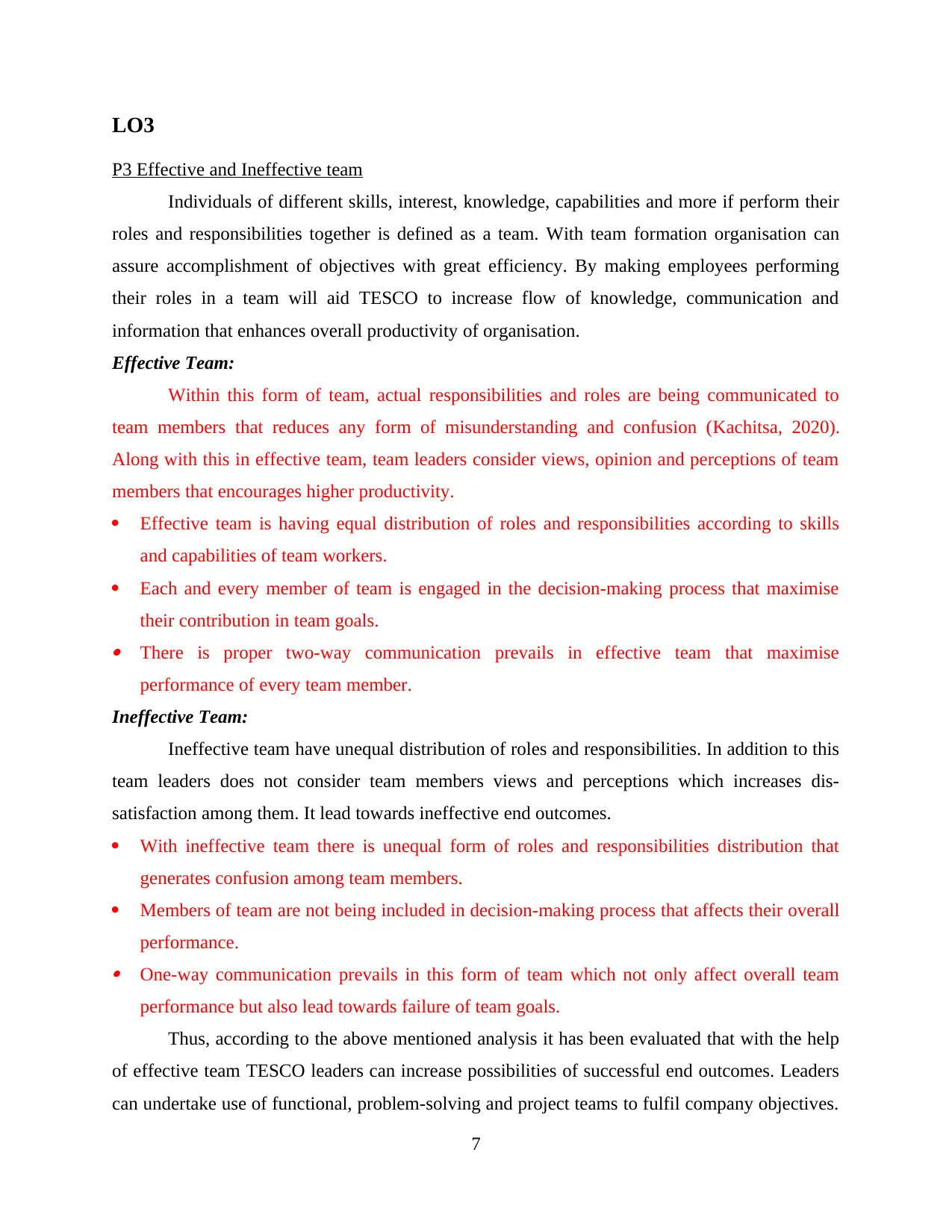
LO3
P3 Effective and Ineffective team
Individuals of different skills, interest, knowledge, capabilities and more if perform their
roles and responsibilities together is defined as a team. With team formation organisation can
assure accomplishment of objectives with great efficiency. By making employees performing
their roles in a team will aid TESCO to increase flow of knowledge, communication and
information that enhances overall productivity of organisation.
Effective Team:
Within this form of team, actual responsibilities and roles are being communicated to
team members that reduces any form of misunderstanding and confusion (Kachitsa, 2020).
Along with this in effective team, team leaders consider views, opinion and perceptions of team
members that encourages higher productivity.
Effective team is having equal distribution of roles and responsibilities according to skills
and capabilities of team workers.
Each and every member of team is engaged in the decision-making process that maximise
their contribution in team goals. There is proper two-way communication prevails in effective team that maximise
performance of every team member.
Ineffective Team:
Ineffective team have unequal distribution of roles and responsibilities. In addition to this
team leaders does not consider team members views and perceptions which increases dis-
satisfaction among them. It lead towards ineffective end outcomes.
With ineffective team there is unequal form of roles and responsibilities distribution that
generates confusion among team members.
Members of team are not being included in decision-making process that affects their overall
performance. One-way communication prevails in this form of team which not only affect overall team
performance but also lead towards failure of team goals.
Thus, according to the above mentioned analysis it has been evaluated that with the help
of effective team TESCO leaders can increase possibilities of successful end outcomes. Leaders
can undertake use of functional, problem-solving and project teams to fulfil company objectives.
7
P3 Effective and Ineffective team
Individuals of different skills, interest, knowledge, capabilities and more if perform their
roles and responsibilities together is defined as a team. With team formation organisation can
assure accomplishment of objectives with great efficiency. By making employees performing
their roles in a team will aid TESCO to increase flow of knowledge, communication and
information that enhances overall productivity of organisation.
Effective Team:
Within this form of team, actual responsibilities and roles are being communicated to
team members that reduces any form of misunderstanding and confusion (Kachitsa, 2020).
Along with this in effective team, team leaders consider views, opinion and perceptions of team
members that encourages higher productivity.
Effective team is having equal distribution of roles and responsibilities according to skills
and capabilities of team workers.
Each and every member of team is engaged in the decision-making process that maximise
their contribution in team goals. There is proper two-way communication prevails in effective team that maximise
performance of every team member.
Ineffective Team:
Ineffective team have unequal distribution of roles and responsibilities. In addition to this
team leaders does not consider team members views and perceptions which increases dis-
satisfaction among them. It lead towards ineffective end outcomes.
With ineffective team there is unequal form of roles and responsibilities distribution that
generates confusion among team members.
Members of team are not being included in decision-making process that affects their overall
performance. One-way communication prevails in this form of team which not only affect overall team
performance but also lead towards failure of team goals.
Thus, according to the above mentioned analysis it has been evaluated that with the help
of effective team TESCO leaders can increase possibilities of successful end outcomes. Leaders
can undertake use of functional, problem-solving and project teams to fulfil company objectives.
7
⊘ This is a preview!⊘
Do you want full access?
Subscribe today to unlock all pages.

Trusted by 1+ million students worldwide
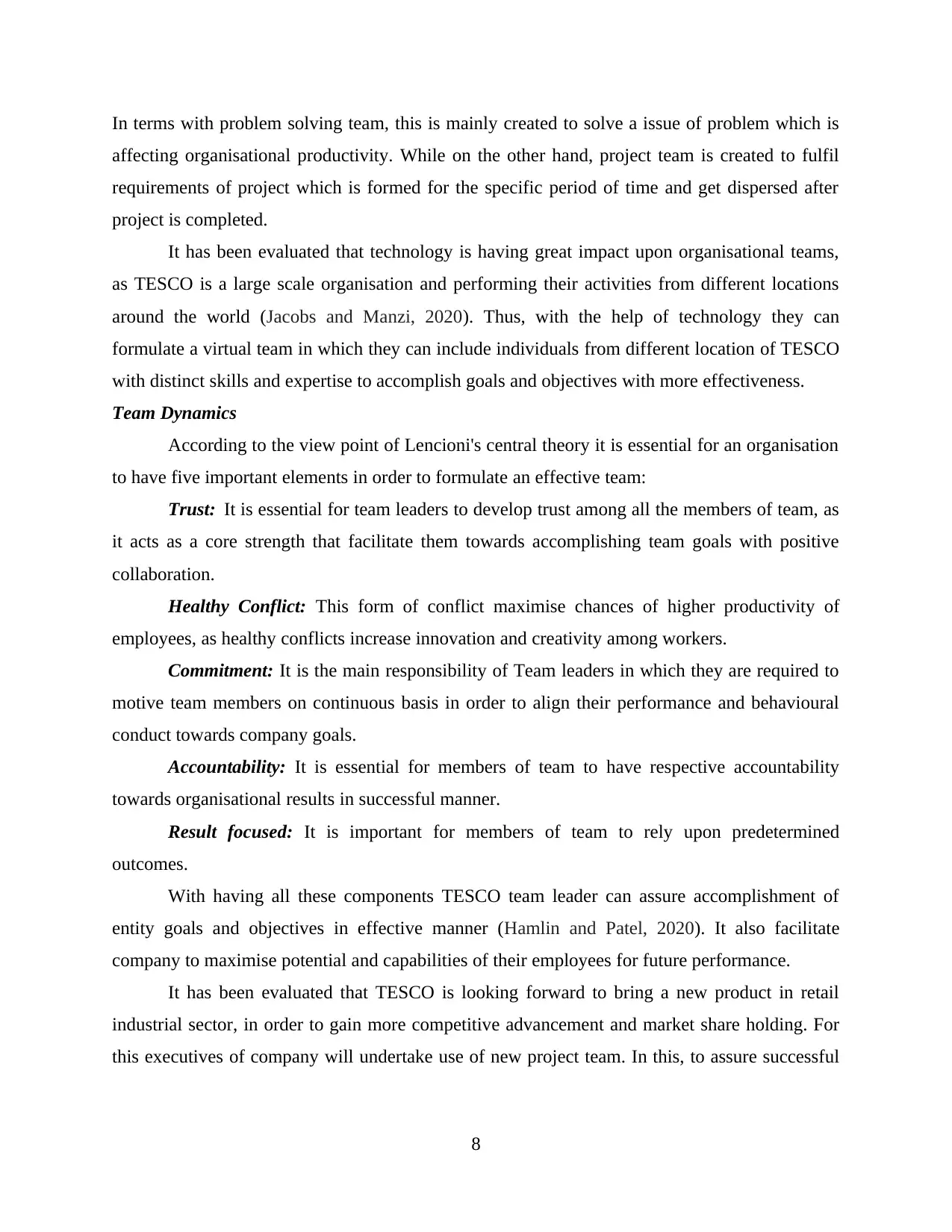
In terms with problem solving team, this is mainly created to solve a issue of problem which is
affecting organisational productivity. While on the other hand, project team is created to fulfil
requirements of project which is formed for the specific period of time and get dispersed after
project is completed.
It has been evaluated that technology is having great impact upon organisational teams,
as TESCO is a large scale organisation and performing their activities from different locations
around the world (Jacobs and Manzi, 2020). Thus, with the help of technology they can
formulate a virtual team in which they can include individuals from different location of TESCO
with distinct skills and expertise to accomplish goals and objectives with more effectiveness.
Team Dynamics
According to the view point of Lencioni's central theory it is essential for an organisation
to have five important elements in order to formulate an effective team:
Trust: It is essential for team leaders to develop trust among all the members of team, as
it acts as a core strength that facilitate them towards accomplishing team goals with positive
collaboration.
Healthy Conflict: This form of conflict maximise chances of higher productivity of
employees, as healthy conflicts increase innovation and creativity among workers.
Commitment: It is the main responsibility of Team leaders in which they are required to
motive team members on continuous basis in order to align their performance and behavioural
conduct towards company goals.
Accountability: It is essential for members of team to have respective accountability
towards organisational results in successful manner.
Result focused: It is important for members of team to rely upon predetermined
outcomes.
With having all these components TESCO team leader can assure accomplishment of
entity goals and objectives in effective manner (Hamlin and Patel, 2020). It also facilitate
company to maximise potential and capabilities of their employees for future performance.
It has been evaluated that TESCO is looking forward to bring a new product in retail
industrial sector, in order to gain more competitive advancement and market share holding. For
this executives of company will undertake use of new project team. In this, to assure successful
8
affecting organisational productivity. While on the other hand, project team is created to fulfil
requirements of project which is formed for the specific period of time and get dispersed after
project is completed.
It has been evaluated that technology is having great impact upon organisational teams,
as TESCO is a large scale organisation and performing their activities from different locations
around the world (Jacobs and Manzi, 2020). Thus, with the help of technology they can
formulate a virtual team in which they can include individuals from different location of TESCO
with distinct skills and expertise to accomplish goals and objectives with more effectiveness.
Team Dynamics
According to the view point of Lencioni's central theory it is essential for an organisation
to have five important elements in order to formulate an effective team:
Trust: It is essential for team leaders to develop trust among all the members of team, as
it acts as a core strength that facilitate them towards accomplishing team goals with positive
collaboration.
Healthy Conflict: This form of conflict maximise chances of higher productivity of
employees, as healthy conflicts increase innovation and creativity among workers.
Commitment: It is the main responsibility of Team leaders in which they are required to
motive team members on continuous basis in order to align their performance and behavioural
conduct towards company goals.
Accountability: It is essential for members of team to have respective accountability
towards organisational results in successful manner.
Result focused: It is important for members of team to rely upon predetermined
outcomes.
With having all these components TESCO team leader can assure accomplishment of
entity goals and objectives in effective manner (Hamlin and Patel, 2020). It also facilitate
company to maximise potential and capabilities of their employees for future performance.
It has been evaluated that TESCO is looking forward to bring a new product in retail
industrial sector, in order to gain more competitive advancement and market share holding. For
this executives of company will undertake use of new project team. In this, to assure successful
8
Paraphrase This Document
Need a fresh take? Get an instant paraphrase of this document with our AI Paraphraser
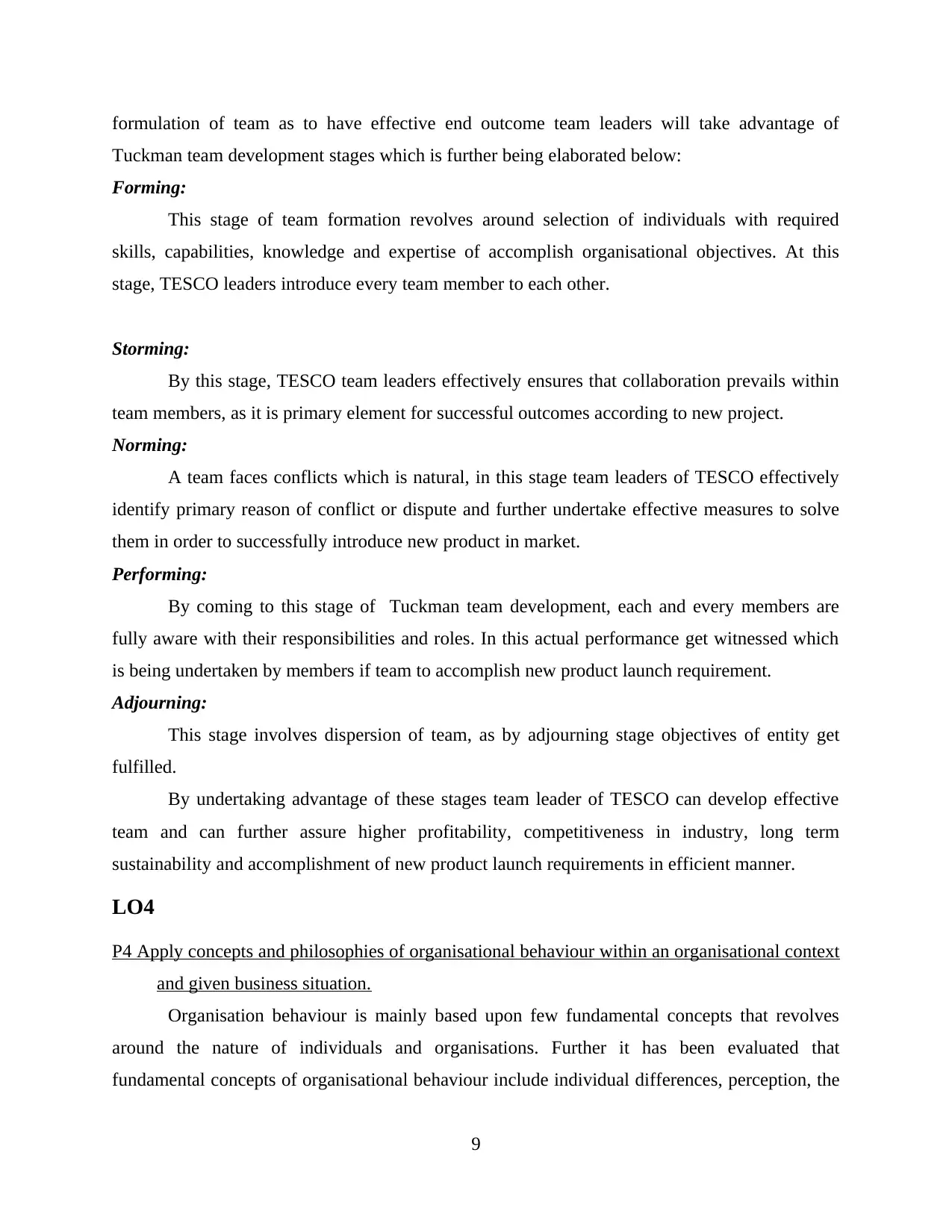
formulation of team as to have effective end outcome team leaders will take advantage of
Tuckman team development stages which is further being elaborated below:
Forming:
This stage of team formation revolves around selection of individuals with required
skills, capabilities, knowledge and expertise of accomplish organisational objectives. At this
stage, TESCO leaders introduce every team member to each other.
Storming:
By this stage, TESCO team leaders effectively ensures that collaboration prevails within
team members, as it is primary element for successful outcomes according to new project.
Norming:
A team faces conflicts which is natural, in this stage team leaders of TESCO effectively
identify primary reason of conflict or dispute and further undertake effective measures to solve
them in order to successfully introduce new product in market.
Performing:
By coming to this stage of Tuckman team development, each and every members are
fully aware with their responsibilities and roles. In this actual performance get witnessed which
is being undertaken by members if team to accomplish new product launch requirement.
Adjourning:
This stage involves dispersion of team, as by adjourning stage objectives of entity get
fulfilled.
By undertaking advantage of these stages team leader of TESCO can develop effective
team and can further assure higher profitability, competitiveness in industry, long term
sustainability and accomplishment of new product launch requirements in efficient manner.
LO4
P4 Apply concepts and philosophies of organisational behaviour within an organisational context
and given business situation.
Organisation behaviour is mainly based upon few fundamental concepts that revolves
around the nature of individuals and organisations. Further it has been evaluated that
fundamental concepts of organisational behaviour include individual differences, perception, the
9
Tuckman team development stages which is further being elaborated below:
Forming:
This stage of team formation revolves around selection of individuals with required
skills, capabilities, knowledge and expertise of accomplish organisational objectives. At this
stage, TESCO leaders introduce every team member to each other.
Storming:
By this stage, TESCO team leaders effectively ensures that collaboration prevails within
team members, as it is primary element for successful outcomes according to new project.
Norming:
A team faces conflicts which is natural, in this stage team leaders of TESCO effectively
identify primary reason of conflict or dispute and further undertake effective measures to solve
them in order to successfully introduce new product in market.
Performing:
By coming to this stage of Tuckman team development, each and every members are
fully aware with their responsibilities and roles. In this actual performance get witnessed which
is being undertaken by members if team to accomplish new product launch requirement.
Adjourning:
This stage involves dispersion of team, as by adjourning stage objectives of entity get
fulfilled.
By undertaking advantage of these stages team leader of TESCO can develop effective
team and can further assure higher profitability, competitiveness in industry, long term
sustainability and accomplishment of new product launch requirements in efficient manner.
LO4
P4 Apply concepts and philosophies of organisational behaviour within an organisational context
and given business situation.
Organisation behaviour is mainly based upon few fundamental concepts that revolves
around the nature of individuals and organisations. Further it has been evaluated that
fundamental concepts of organisational behaviour include individual differences, perception, the
9
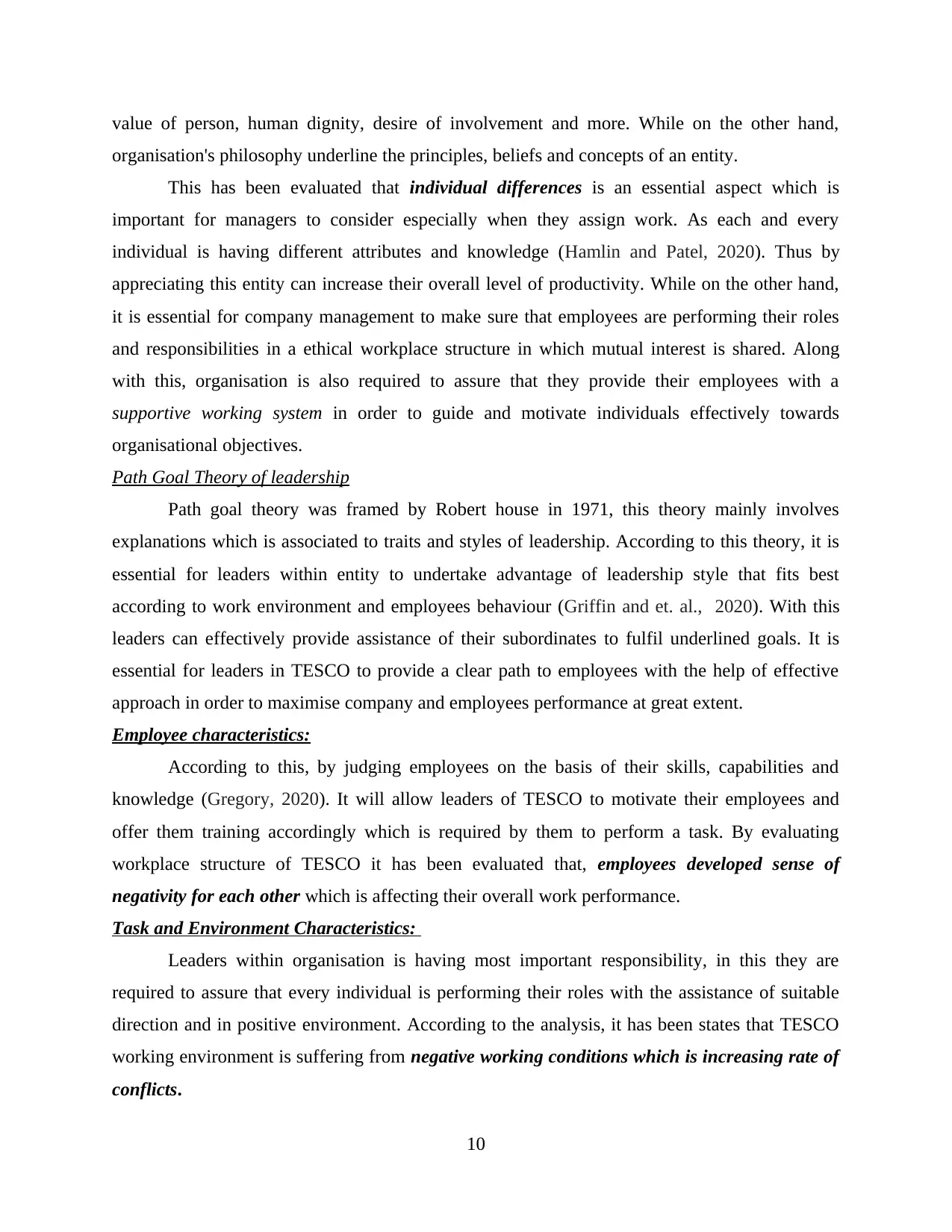
value of person, human dignity, desire of involvement and more. While on the other hand,
organisation's philosophy underline the principles, beliefs and concepts of an entity.
This has been evaluated that individual differences is an essential aspect which is
important for managers to consider especially when they assign work. As each and every
individual is having different attributes and knowledge (Hamlin and Patel, 2020). Thus by
appreciating this entity can increase their overall level of productivity. While on the other hand,
it is essential for company management to make sure that employees are performing their roles
and responsibilities in a ethical workplace structure in which mutual interest is shared. Along
with this, organisation is also required to assure that they provide their employees with a
supportive working system in order to guide and motivate individuals effectively towards
organisational objectives.
Path Goal Theory of leadership
Path goal theory was framed by Robert house in 1971, this theory mainly involves
explanations which is associated to traits and styles of leadership. According to this theory, it is
essential for leaders within entity to undertake advantage of leadership style that fits best
according to work environment and employees behaviour (Griffin and et. al., 2020). With this
leaders can effectively provide assistance of their subordinates to fulfil underlined goals. It is
essential for leaders in TESCO to provide a clear path to employees with the help of effective
approach in order to maximise company and employees performance at great extent.
Employee characteristics:
According to this, by judging employees on the basis of their skills, capabilities and
knowledge (Gregory, 2020). It will allow leaders of TESCO to motivate their employees and
offer them training accordingly which is required by them to perform a task. By evaluating
workplace structure of TESCO it has been evaluated that, employees developed sense of
negativity for each other which is affecting their overall work performance.
Task and Environment Characteristics:
Leaders within organisation is having most important responsibility, in this they are
required to assure that every individual is performing their roles with the assistance of suitable
direction and in positive environment. According to the analysis, it has been states that TESCO
working environment is suffering from negative working conditions which is increasing rate of
conflicts.
10
organisation's philosophy underline the principles, beliefs and concepts of an entity.
This has been evaluated that individual differences is an essential aspect which is
important for managers to consider especially when they assign work. As each and every
individual is having different attributes and knowledge (Hamlin and Patel, 2020). Thus by
appreciating this entity can increase their overall level of productivity. While on the other hand,
it is essential for company management to make sure that employees are performing their roles
and responsibilities in a ethical workplace structure in which mutual interest is shared. Along
with this, organisation is also required to assure that they provide their employees with a
supportive working system in order to guide and motivate individuals effectively towards
organisational objectives.
Path Goal Theory of leadership
Path goal theory was framed by Robert house in 1971, this theory mainly involves
explanations which is associated to traits and styles of leadership. According to this theory, it is
essential for leaders within entity to undertake advantage of leadership style that fits best
according to work environment and employees behaviour (Griffin and et. al., 2020). With this
leaders can effectively provide assistance of their subordinates to fulfil underlined goals. It is
essential for leaders in TESCO to provide a clear path to employees with the help of effective
approach in order to maximise company and employees performance at great extent.
Employee characteristics:
According to this, by judging employees on the basis of their skills, capabilities and
knowledge (Gregory, 2020). It will allow leaders of TESCO to motivate their employees and
offer them training accordingly which is required by them to perform a task. By evaluating
workplace structure of TESCO it has been evaluated that, employees developed sense of
negativity for each other which is affecting their overall work performance.
Task and Environment Characteristics:
Leaders within organisation is having most important responsibility, in this they are
required to assure that every individual is performing their roles with the assistance of suitable
direction and in positive environment. According to the analysis, it has been states that TESCO
working environment is suffering from negative working conditions which is increasing rate of
conflicts.
10
⊘ This is a preview!⊘
Do you want full access?
Subscribe today to unlock all pages.

Trusted by 1+ million students worldwide
1 out of 16
Related Documents
Your All-in-One AI-Powered Toolkit for Academic Success.
+13062052269
info@desklib.com
Available 24*7 on WhatsApp / Email
![[object Object]](/_next/static/media/star-bottom.7253800d.svg)
Unlock your academic potential
Copyright © 2020–2025 A2Z Services. All Rights Reserved. Developed and managed by ZUCOL.





